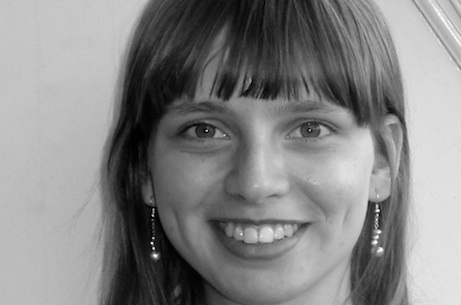
Maria Pawlowska is both a lecturer on a science-based gender course she devised and works in the Polish Prime Minister's office on gender equality.
Maria Pawlowska [2007] was all set on a career as a paleontologist- something she had set her heart on since she was a child – when she read Khalid Husseini’s searing novel A Thousand Splendid Suns about women living under the Taliban in Afghanistan.
Reading the book was the culmination of a long-burning desire to become actively involved in campaigning for gender equality in her own country, Poland. Just three years after completing her PhD she is using her scientific knowledge to help Polish students debunk gender stereotypes and working to promote gender equality from within the Prime Minister’s office.
Maria was born in Warsaw and says her family shaped her views on gender politics. Her mother is a law professor and her father worked as a sociologist before moving to law and a job in the Supreme Administrative Court. She describes her parents’ feminism as having fundamentally shaped her as an adult.
Her father was one of the founders of the Polish Feminist Society. “I did not know that not everyone was a feminist or for gender equality till I was 10. It was a value I grew up with and one of the most important things my parents taught me and my sister,” she says. “I was totally shocked when people said they were not feminists. I was brought up with the idea that society was not going to limit what I could do and that I would not be judged by what I looked like.”
Paleontology
Maria spent part of her childhood in the US as her mother won a Fulbright Scholarship to study there. The family were there for two and a half years and Maria was in an elementary school there where she was introduced to a different, less formal approach to education.
From the age of seven Maria, who excelled at biology, wanted to be a paleontologist. When she finished school, she applied to the University of Bristol to do a joint degree in biology and geology. She chose Bristol because the course was unique in Europe and was taught by Professor Michael Benton, a well-known paleontologist. There were only five students on the course and Maria describes the experience as “incredible”. The research she did for her BSc was published in the journal Science and she went straight to a PhD at Cambridge from there.
She finished her PhD, but started working with NGOs and making contact back in Poland where she was interested in campaigning on reproductive health and gender issues, including sex education, contraception and abortion.
Her husband, Gates Cambridge Alumnus Jakub Szamalek, got a job back in Poland so the couple moved back. She had worked as a policy analyst in London, but when she got back to Poland she got a job as a gender studies lecturer at the Polish Academy of Sciences.
Gender course
She runs the first science-based gender course there, using her scientific background to, among other issues, show how many studies which had been used to back traditional stereotypes about women were based on small sample sizes or unscientific methodology.
“I present the scientific facts and show how they have been twisted by politicians and explore how biology has been used as a tool to discriminate against women,” she says. She adds that a lack of sex education and abortion means women in Poland are terrified of getting pregnant.
In April, she got a job in the Prime Minister’s office as a gender equality public policy expert, working for the equivalent of the ministry of equality. One of the first projects she has been involved with in government is a campaign aimed at raising awareness about sexual violence. She says less than 700 cases of rape go to Polish courts every year. “It’s a joke,” she says. “Women are not coming forward. We hope to change that.”
The law on prosecuting rape has changed in recent months. In the past cases could only be prosecuted based on a complaint filed by a victim and proceedings were not able to continue if the victim withdrew her or his complaint. Reporting the crime was not enight to get it prosecuted. This has now finally changed and Polish law is like that of all other EU countries now.
Maria says it is exciting being in government. “I feel I can make a difference if I work for the government,” she says, although she is keen to keep a toe in academia and has got some great feedback from her classes and workshops, including a leadership course for women on reproductive rights at the Congress of Women in Poland.
She says she will not forget her time as a Gates Cambridge Scholar. “It was a life-changing experience being with such inspirational people,” she says. “They made me want to do more with my life.”












